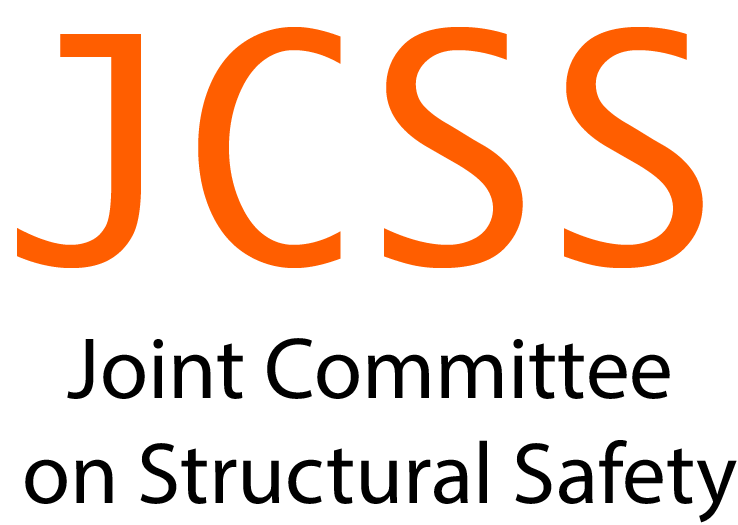JCSS Workshop on the Assessment of Existing Structures¶
28th & 29th January 2021¶

Introduction¶
The Joint Committee on Structural Safety (JCSS) has organised this workshop split over two-half days, to be held virtually on the 28th and the 29th of January 2021, on the important topic of the Assessment of Existing Structures. The aim of the workshop was established to bring together leading International researchers and practitioners to discuss the issues around appropriate and alternative assessment methodologies, incorporation of testing and monitoring data, of code development and calibration as well as to present examples of best practice from international participants.
The workshop is structured around five technical sessions namely (i) Practical Assessment, (ii) Semi-Probabilistic Methods, (iii) Codification, (iv) Probabilistic Methods and (iv) Updating and Monitoring. The sessions will see presentations by leading International experts in these topics. The presentations are intended to point to the accomplishments and effectiveness of existing methods whilst at the same time highlighting the challenges and potential for further developments in research, standards and practice. It was decided early in the planning to conclude each session with a moderated discussion to be chaired by individuals with significant expertise in these fields. It is intended that the moderated discussions which will offer an opportunity for the 200+ International participants to exchange views and experiences and to foster continued progress.
The workshop benefits considerably from perspectives offered at the outset by Prof. Michael Faber and Prof. Steve Denton and in conclusion by Prof. Jochen Köhler. Furthermore following the event it is the intention of the JCSS to produce a report detailing perspectives and conclusions. A special issue of an International Journal dedicated to disseminating the key content of the workshop is also planned. The JCSS website (www.jcss-lc.org) will serve as a repository for all of the workshops contents thereby providing a valuable resource for practitioners and researchers into the future.
The timing of the workshop is very appropriate given the current activity to develop a Eurocode part on the Basis of Assessment and Retrofitting of Existing Structures. It is hoped that the content of the workshop both in terms of the presentations but also via the moderated discussions can inform this process. Overall the event promises to be of great interest to those involved in this important area and we look forward to your full and active participation.
Professor Alan O’Connor¶
Trinity College Dublin, Ireland, Chair of the Organising Committee
Welcome Address¶
by Prof. Michael Faber, Professor on Risk Informed Decision Support for Structures Aalborg University, Denmark, President of the JCSS
Abstract: One of the major contemporary challenges of the structural engineering community is to identify new best practices for the development, maintenance and renewal of the built environment; new best practices that ensure an adequate balance between the welfare it facilitates and the environmental impacts it implies. In this context, integrity management of existing structures plays a key role as a major contributor to expenditures and not least through substantial impacts to the qualities of the environment. Reassessment of structures entails the process of gathering and conceiving information in support of structural integrity management. The scientific basis for this is readily available in the Bayesian probability theory and the Bayesian decision analysis since more than 70 years and its application in structural engineering as a means for reassessing structures goes back at least 40 years by now. In the present presentation, starting point will be taken in a very brief overview of early achievements in the area of probabilistic reassessment of structures, as well as previous contributions to standardization of approaches and procedures for doing so. Thereafter, core potentials and challenges associated with probabilistic reassessment of structures in the context of standardization are summarized. Finally, the presentation concludes with a view to the “near future” impact of what is presently referred to as Industry 4.0 – a reality that standardization of reassessment of structures must embrace.
Opening Speech¶
by Prof. Steve Denton FREng Head of Civil, Bridge and Ground Engineering, WSP Visiting Professor, University of Bath, UK, Chairman, CEN/TC 250
Abstract: As structural engineers work to extend the life of existing structures, the accurate assessment of current and future structural performance has become a central activity of engineering practice. The sustainability benefits of such work can be profound, eliminating the cost, carbon, environmental and social impacts of reconstruction. CEN/TC 250, the committee responsible for the structural Eurocodes, has recognised the benefits of international standardisation in this field, and will include content on assessment in the second generation of the Eurocodes. Important progress has been made, but challenges remain in building consensus. In contrast to the expectations of some, the development of standards for assessment is more difficult than for design. Whereas a designer can define requirements for material, detailing and workmanship, in assessment one has to work with the available knowledge of what is there, and therefore, assessment standards must cater for a multitude of possibilities that are expanded by historic variations in construction practices. Events such as this important workshop are vital in helping build consensus and serve to shape the collective understanding of those aspects of assessment practice that have reached the level of maturity necessary for standardisation.
